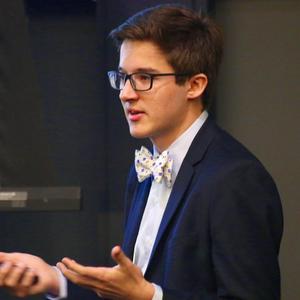Splash Biography
ANDREW SAYDJARI, Chemistry BS/MS; Mathematics BS 2018
|
Major: Chemistry/Mathematics College/Employer: Yale Year of Graduation: 2018 |

|
Brief Biographical Sketch:
A student of all things, I love to teach about my current obsessions--spreading both enthusiasm and knowledge. My favorite teaching mantra is : It is better to uncover a little than to cover a lot! Teaching lies in the asking and answering of questions, so I will never curtail questions. Past Classes(Clicking a class title will bring you to the course's section of the corresponding course catalog)E2844: Origins of Life- A Chemist's Perspective in Sprout Fall 17 (Sep. 30 - Oct. 14, 2017)
How did we come to be? This question resonates throughout history and touches every discipline. Herein, we explore both competing historical perspectives and cutting-edge theories/research from a chemical perspective. Focus will be given to many supposed paradoxes and controversies (i.e. Faint Sun, Levinthal's, ...). The culmination of our work will knock down the wall between kinetics and thermodynamics-- breaking the cardinal rule of chemistry.
M2985: Abstract Algebra: Questions Teachers Refused to Answer in High School in Splash Fall 17 (Nov. 11, 2017)
Why can’t I divide by zero? Why can’t I cancel “x” from both sides of a polynomial equation. Why can’t I have more than two operations (addition/subtraction, multiplication/division) on a set? Frequently, these questions are dismissed in early math classes. However, the answer most certainly is not: “It just is that way.” This course will give an introduction to the fundamental structures that underlie all of math and answer some of these simple, but deep questions. While not comparable to a full semester course in abstract algebra, expect to gain a working familiarity with extremely powerful concepts. Examples and applications will be accessible to all levels of prior math experience.
Key Words: Group, Ring, Vector Space, Module, Field, Algebra
C2456: Peeling Back the Layers of Solar Cells: The Physics, Chemistry, and Biology of Solar Energy in Sprout Spring 17 (Feb. 11 - 25, 2017)
With an energy crisis on the horizon, solar energy storage has become a hot topic in modern science. What is the best way to capture solar energy? Once we have that energy, how to we store it? However, there are so many different types of solar cells being used that reading even popular science articles can be confusing. We will systematically clarify the major categories of solar cells, including the system used by nature, and explain how they work from a physics, biology, or chemistry perspective. Topics will include solar thermal collectors, photovoltaics, dye-sensitized solar cells, photosynthesis, solar electrolysis, and solar thermal cells.
S2351: Metal Mania: Simple Models of the Material World in Splash Fall 16 (Nov. 05, 2016)
Why are electrical conductors always thermal conductors? What determines the properties of one material over another? While much of modern materials science appears like trial and error from the outset, this course will motivate the deep physical differences (using extremely simple models) between metals, insulators, etc. that determine a large variety of properties in the world around us.
E2143: The Matrix: A Mathematical Construct in Sprout Fall 16 (Oct. 01 - 15, 2016)
This course will cover matrices from start to finish. The basic underpinnings of matrix operations and multiplication will be motivated (as well as their relation to abstract mathematical structure and spaces). Further, the course will attempt to give a strong understanding of the "right" way to think about matrices, such that generalization to tensors is easy.
M1939: Abstract Algebra: Questions Teachers Refused to Answer in High School in Splash Spring 16 (Apr. 02, 2016)
Why can’t I divide by zero? Why can’t I cancel “x” from both sides of a polynomial equation. Why can’t I have more than two operations (addition/subtraction, multiplication/division) on a set? Frequently, these questions are dismissed in early math classes. However, the answer most certainly is not: “It just is that way.” This course will give an introduction to the fundamental structures that underlie all of math and answer some of these simple, but deep questions. While not comparable to a full semester course in abstract algebra, expect to gain a working familiarity with extremely powerful concepts. Examples and applications will be accessible to all levels of prior math experience.
Key Words: Group, Ring, Vector Space, Module, Field, Algebra
S1773: Origins of Life- A Chemist's Perspective in Splash Fall 15 (Nov. 14, 2015)
How did we come to be? This question resonates throughout history and touches every discipline. Herein, we explore both competing historical perspectives and cutting-edge theories/research from a chemical perspective. Focus will be given to many supposed paradoxes and controversies (i.e. Faint Sun, Levinthal's, ...). The culmination of our work will knock down the wall between kinetics and thermodynamics-- breaking the cardinal rule of chemistry.
|
|
